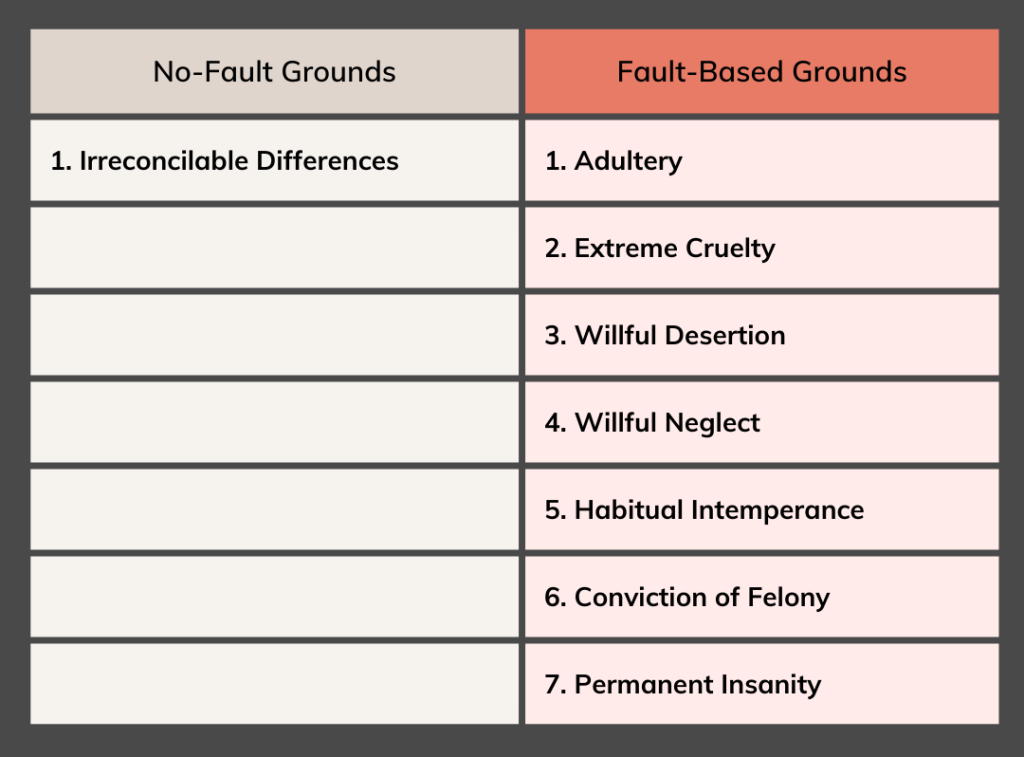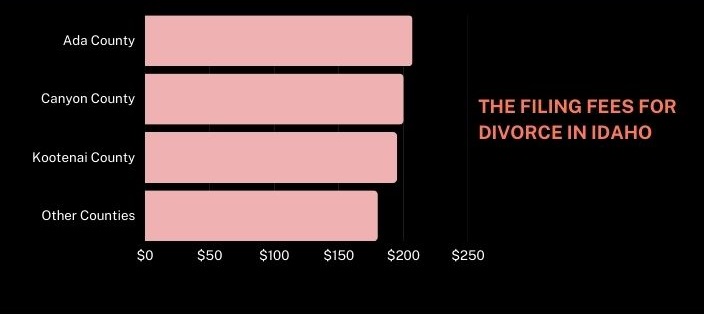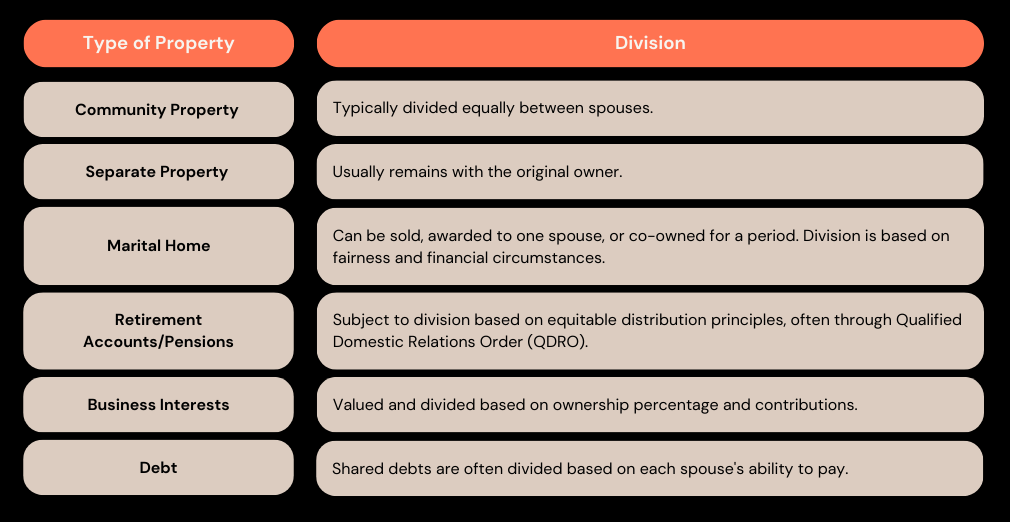To get a divorce in Idaho, you first need to familiarize yourself with the state’s laws on the grounds for marriage dissolution, the steps necessary for its finalization, and the terms of property division, maintenance, and child custody and support. In this article, we have provided the answers to the most probable questions you may have during the divorce process.
Table of Contents
ToggleIs Idaho a No-Fault State?
Idaho is both a fault and a no-fault state. It means that you can file for divorce with or without proving in court that the other spouse’s actions led to the marriage breakdown. To start the Idaho divorce process, you need to determine the grounds for your divorce and analyze if you and your spouse have any disagreements regarding child custody, support, visitation, property division, etc. Uncontested divorce in Idaho, when you have agreed with your partner on all divorce issues, is the easiest and fastest way to dissolve the marriage.
The Grounds for Divorce in Idaho
Depending on whether the actions of one spouse led to the breakup of marital relations or the parties do not accuse each other, grounds for divorce can be fault or no-fault.

No-Fault Grounds
You can start a no-fault divorce in Idaho based on two legally accepted reasons:
- You and your spouse have irreconcilable differences that make it impossible to continue the marriage, and you would like it to be terminated. It is the most common ground for a no-fault dissolution of marriage.
- You and the other party have lived separately for 5 years without cohabitation and can prove it by providing evidence to the court.
Fault-Based Grounds
Fault-based grounds for divorce are used when the conduct of one spouse results in the breakdown of a marriage. These can be:
- Adultery, when one of the parties engages in a voluntary sexual relationship with a person who is not their husband or wife.
- Extreme cruelty that leads to mental suffering or physical injuries.
- Willful desertion for no less than 1 year, when one spouse intentionally separates from the other.
- Willful neglect, when a husband refuses to support a wife despite being able to do so for 1 year or more.
- Habitual intemperance, when the alcohol abuse by one spouse is constant, lasts for at least 1 year, and makes marital life unbearable for the other spouse.
- A felony conviction of one spouse during a marriage.
- Incurable insanity, provided that the mentally ill spouse was under treatment for 3 years before the divorce was initiated and was recognized by the court as a person without a chance for recovery.
Residency Requirements for Filing for Divorce in Idaho
According to the state residency requirements, filing a petition and getting a divorce in Idaho become possible if a petitioner has lived in the state for at least 6 weeks. It doesn’t matter where a marriage was registered or whether the other party lives in the state.
How to File for Divorce in Idaho?
To file for divorce in Idaho, you must prepare forms for your case and submit them to the county clerk’s office. How long the process of filing for divorce in Idaho will take depends on how quickly you can find and fill out the necessary documents.
Your next steps after submitting the paperwork to the court will be:
- Serving a spouse. A petitioner can do it in person if a respondent is cooperative and will sign an Affidavit of Service. Also, they may hire a sheriff or a private process server or ask any person over 18 to deliver documents to the other party. If parties are in agreement, they can file a Sworn Stipulation for Entry of Decree and some other documents, and there will be no need to serve the other spouse.
- Waiting till the response is provided. A respondent has 21 days to file an answer to the petition; if they fail to respond, a petitioner may ask the court for a default judgment.
- Completing parenting classes and working on financial disclosure, if applicable.
- Finalizing the case. After the response is provided and the waiting period is over, spouses may go through mediation to resolve disputed issues, if any. If they cannot agree, the case will go to trial.
If the divorce is uncontested and the paperwork is in order, a couple may not be required to attend a hearing. The judge will review the documents, consider the decisions made by spouses, and sign a divorce decree.

What Is the First Step in Idaho Divorce?
One of the first steps in any divorce process is to fill out the petition and other documents necessary for your case.
Mandatory divorce papers for filing typically include:
- Petition for Divorce. It is the main form needed to start the divorce process. It contains information about spouses, the reasons and circumstances of your marriage dissolution, etc.
- Summons. This legal document issued by the court notifies a respondent about the beginning of the divorce process.
- Family Law Case Information Sheet. This form is filled out to show the court the basic details about spouses and the case with which they apply.
This list is surely far from final. Couples with children will need some additional papers, such as an Order to Attend Parenting Workshop and Affidavit Verifying Income. If you do not know where your spouse is, you will also need Motion and Affidavit for Service by Publication and Order for Service.
The exact list of required forms may not be easy to determine since it depends on each specific case. You can use an online document preparation service to get divorce papers ready without stress. With its help, you will not have to search for the necessary forms on your own and fill them out or spend thousands on a lawyer’s assistance. You will just need to pass a convenient online questionnaire to get a set of ready-to-use documents for your uncontested marriage dissolution and detailed filing instructions.

Where to File Your Divorce Case?
If your spouse lives in the state, you should submit documents to the court in the county where they reside. If the other party lives out of state, you can file a petition in your county of residence. Online filing is also available through the Idaho iCourt website. However, it is worth checking in advance whether online submission of documents is possible in your case.
The Filing Fees for Divorce in Idaho.

To file for divorce, you will have to pay mandatory court fees. Currently, the Idaho divorce filing fee is $207. In addition, you will need to pay from $20 to $50 for serving a spouse and from $35 for attending parenting classes if you have minor children.
You can apply for a waiver if you cannot cover the fees. You will need to list your income, expenses, assets, and debts in a Motion and Affidavit for Fee Waiver to prove to the court your financial status. If you qualify, you will be allowed not to pay the filing fees.
How Much Does a Divorce Cost in Idaho?
The average cost of divorce in Idaho for uncontested cases is between $250 and $1,000 if a couple has agreed on all marital issues and does not hire an attorney. If a lawyer is involved, the expenses may reach $5,000 on average.
Contested divorces cost more, with prices easily exceeding $10,000. It depends on the number of disputes between spouses regarding property division, child custody, maintenance, etc., and which specialists must be involved. They can be evaluators, lawyers, mediators, private experts on children’s issues, etc.
How Long Does a Divorce Take in Idaho?

The timeline for an uncontested divorces in Idaho
You can get a divorce in Idaho no earlier than 21 days after serving the other party, which is a typical Idaho divorce waiting period. The average duration of divorce is from 1 to 3 months for uncontested cases and from 6 to 12 months for contested ones. The timelines depend on how quickly spouses can reach an agreement on marital issues, how soon they can complete parenting classes if there are children involved, how busy the court’s schedule is, etc.
Is Idaho a 50/50 Divorce State?
Idaho is a community property state. It means that all property, assets, and debts spouses acquired during the marriage should be divided equally during the divorce. There are many factors that the court will take into consideration while dividing property, as specified below.
How to Split up Assets During a Divorce in Idaho?
All assets procured during the marriage are considered marital property. Assets each spouse got before the marriage will likely be regarded as their personal property and will not be shared. These are some general aspects of division:
- Assets to divide can be real estate, businesses, bank deposits, pensions, etc. In most cases, they are distributed 50/50, but sometimes, the court can make the other decision after considering the income of each spouse, health status, age, etc.
- The business one of the parties owned before the marriage may not be divided if the other spouse has not become a co-owner during the marriage. In cases when a couple consolidates separate businesses or starts a new one during the marriage, it will be considered marital business.
- Bank accounts and pensions will be divided similarly. In most cases, debts will also be divided during a divorce if they are acquired in a marriage.
- Inheritance and gifts are personal ownership of each spouse and will likely remain their personal property after divorce.
The 50/50 split is a general rule which may not work for each particular case. Since the assets division is a complicated stage of the divorce process, it is reasonable to involve various specialists, such as accountants, evaluators, financial analysts, etc., to determine the actual value of all assets and ensure their fair division between parties.
How to Divide Property After Divorce?
According to Idaho divorce laws on marital property division, all real estate objects that spouses acquired during the marriage are their joint ownership, which must be divided in half after the divorce. Gifts and inheritance of each spouse, just as in the situation with assets, will likely be considered a separate property that should not be divided.
If one spouse owned a house before the marriage, it will likely not be shared between parties. However, if, for example, the house was inherited by one of the spouses, but a couple maintained it together and the other spouse made a significant financial contribution to it, it can be considered joint and subject to division.

During the divorce process, you and your spouse can independently determine how to divide the property. If you disagree about it, the judge will decide on the issue, taking into account the following factors:
- Duration of marriage.
- Presence of a marriage contract.
- Age and health status of each party.
- Availability of spouses’ education and a permanent workplace.
- Possibility of employment if one of the parties does not work at the time of divorce.
- Special needs.
- Availability of pension or social benefits.
- Award maintenance to one of the parties.
How to Manage Child Support and Alimony Under Idaho Divorce Laws?
Alimony in Idaho, also known as maintenance, can be granted by the court so that one spouse financially supports the other one during or after the divorce. One party can receive alimony if they are not financially capable to meet their needs or do not have the opportunity to get a job to support themselves.
Court-ordered spousal support in Idaho can be:
- temporary, that lasts during the divorce process,
- short-term until the requesting spouse gets an education and/or job,
- long-term, usually granted based on a spouse’s special needs.
When deciding on alimony, the court will take into account the following factors, among others:
- How long the marriage lasts.
- What income and needs you have.
- Whether you have your own property or assets.
- How long it will take you to get an education or a job.
- Your emotional and physical state.
- What the ground for divorce is.
- Whether your spouse has the financial ability to support you after the dissolution of marriage.
The amount of child support may be calculated using the income share model. Its basic principle is that children should get the same proportion of their parents ‘ income after divorce as they would have received if their parents had continued living together.
In determining the amount of child support, the judge will analyze:
- Educational and financial needs of children.
- Financial capabilities of custodial and non-custodial parent.
- Emotional conditions of children.
- Availability of medical insurance for children.
- Necessity in additional expenses related to children’s health or special needs.
The court will decide on child support using the Guidelines of the Supreme Court of Idaho. If any spouses’ income changes and they do not have the financial ability to support the children in the former amount, they can submit a petition to the court with a request to review it.
How Does Adultery Affect Divorce in Idaho?

If you initiate a fault divorce based on adultery, you should know how spouses’ infidelity affects divorce in Idaho. According to Idaho divorce laws, adultery can be taken or not taken into account by the judge as a factor in deciding marriage termination issues. In most cases, adultery may affect the alimony award.
If a spouse who did not cheat wants to receive maintenance, there is a high probability that the court will grant such a request. If the cheating party needs support, the court can significantly reduce the amount of alimony.
Typically, adultery does not impact the determination of child custody if it does not negatively affect kids. When awarding custody, the court takes into account other factors, such as children’s interests and wishes, the relations with parents, the emotional and physical state of spouses, etc.
The Bottom Line
To sum up, different rules guide the divorce process in Idaho. The more conflicts spouses have to resolve, the longer the marriage termination will take and the higher the expenses will be.
If the case is uncontested, spouses are not required to involve lawyers in the process and can go through it on their own. For contested cases, seeking legal assistance is advisable.
In uncontested cases, spouses can simplify the filing stage and order divorce documents from online services; this way, they will not need to cover high lawyer’s fees for paperwork or spend days looking for the needed forms and completing them on their own.
With a set of filled-out divorce papers, spouses can either initiate online divorce in Idaho if electronic filing is suitable for their case or follow the filing instructions provided and submit documents in person to the clerk’s office of a local court.


Richard Evans is a former family law attorney and a writer on divorce-related matters. His extensive legal experience provided him with deep insights into the intricacies of divorce and helped him recognize the need for accessible advice on these issues. His articles cover a range of topics, including understanding divorce laws, navigating custody battles, and managing post-divorce finances. Through his writing, Evans applies his legal expertise to demystify the divorce process and provide practical advice for those experiencing this challenging life event.



